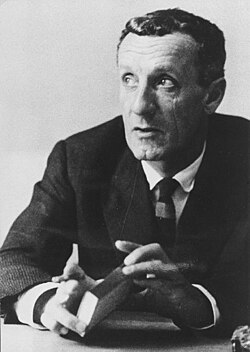Maurice Merleau-Ponty Quote
Visible and mobile, my body is a thing among things; it is one of them. It is caught in the fabric of the world, and its cohesion is that of a thing. But because it sees and moves itself, it holds things in a circle around itself. Things are an annex or prolongation of my body; they are incrusted in its flesh, they are part of its full definition; the world is made of the very stuff of the body. These reversals, these antinomies, are different ways of saying that vision is caught or is made in the middle of things, where something visible undertakes to see, becomes visible for itself and through the vision of all things, where the indivision of the sensing and the sensed persists, like the original fluid within the crystal.
Visible and mobile, my body is a thing among things; it is one of them. It is caught in the fabric of the world, and its cohesion is that of a thing. But because it sees and moves itself, it holds things in a circle around itself. Things are an annex or prolongation of my body; they are incrusted in its flesh, they are part of its full definition; the world is made of the very stuff of the body. These reversals, these antinomies, are different ways of saying that vision is caught or is made in the middle of things, where something visible undertakes to see, becomes visible for itself and through the vision of all things, where the indivision of the sensing and the sensed persists, like the original fluid within the crystal.
Related Quotes
About Maurice Merleau-Ponty
At the core of Merleau-Ponty's philosophy is a sustained argument for the foundational role that perception plays in the human experience of the world. Merleau-Ponty understands perception to be an ongoing dialogue between one's lived body and the world which it perceives, in which perceivers passively and actively strive to express the perceived world in concert with others. He was the only major phenomenologist of the first half of the twentieth century to engage extensively with the sciences. It is through this engagement that his writings became influential in the project of naturalising phenomenology, in which phenomenologists use the results of psychology and cognitive science.
Merleau-Ponty emphasised the body as the primary site of knowing the world, a corrective to the long philosophical tradition of placing consciousness as the source of knowledge, and maintained that the perceiving body and its perceived world could not be disentangled from each other. The articulation of the primacy of embodiment (corporéité) led him away from phenomenology towards what he was to call "indirect ontology" or the ontology of "the flesh of the world" (la chair du monde), seen in his final and incomplete work, The Visible and Invisible, and his last published essay, "Eye and Mind".
Merleau-Ponty engaged with Marxism throughout his career. His 1947 book, Humanism and Terror, has been widely understood as defense of the Moscow Trials. Slavoj Žižek opines that it avoids the definitive endorsement of a view on the Soviet Union, but instead engages with the Marxist theory of history as a critique of liberalism, in order to reveal an unresolved antinomy in modern politics, between humanism and terror: if human values can only be achieved through violent force, and if liberal ideas hide illiberal realities, how is just political action to be decided?
